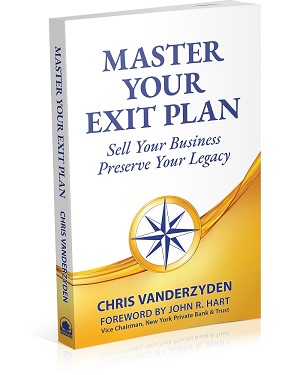What I liked about Chris Vanderzyden’s new book is how deliberately plainspoken and concise it is. There’s no beating around the bush or tangential semantics, while simultaneously Vanderzyden never shies from highlighting the less coldly rational and more emotive aspects of approaching titular peak transition periods.
LEGACY PARTNERS LLP: https://legacypartnersllp.com/
“Your business goals can become your destiny, with a plan to see it through,” Vanderzyden writes, in the aptly titled Master Your Exit Plan: Sell Your Business, Preserve Your Legacy. “…Identifying your professional and personal goals is the first step in creating a post-ownership plan, which is an integral part of your MEP. Most owners have never thought about the possibilities and certainly haven’t planned for it…Business owners are often slow to develop their exit plan. However, once they understand the risk of not planning their exit and that it won’t be painful or complicated, they have some fun with it and start to dream about the possibilities for their life post-ownership.
Some want to retire, sit on a beach, go fishing, travel the world, or see the grandkids more. Others may want to get back in the game and start a new business. Many are serial entrepreneurs who love innovation and want to go on to the next great challenge. Some qualify that statement by insisting the next business will be easier, simpler, less risky. Very often I hear business owners say, ‘I want another business, but with no employees!’ That always makes me laugh. And many want to give back to their communities at a higher level. Whatever your goal, it must be carefully planned so there are no regrets after you sell.”
“…The primary reason is that many owners experience an enormous loss of identity, diminished sense of passion and purpose, undermined social structure, and lack of direction,” she continues. “Some business owners who ended up pining for their old business during their noncompete period reacted by launching unrelated new businesses in an effort to ease the regret, only to fail miserably and lose a great deal of the money they made selling their old business.”
I appreciated how Vanderzyden humanizes the different retiring leadership profiles she uses as an example. There’s a sense she has a genuine enthusiasm for the material she promotes, not just an earned expertise. You feel that the read has an almost conversational quality – a sort of confident assurance on Vanderzyden’s part that because of her solidity with what she preaches, she’s able to be somewhat tonally amorphous. That’s the sign for the reader they’re in good hands, the fact there never has to be a rigidity or lack of focus on the communication aspect. Because of this, you don’t feel repelled by times Vanderzyden makes it personal. Rather, it just draws you in closer – on an emotional as well as intellectual level.
AMAZON: https://www.amazon.com/Master-Your-Exit-Plan-Business/dp/1945847573
“What makes a business owner wealthy? Happiness. It’s ultimately not how many dollars are in the bank, but the fulfillment you derive from life,” Vanderzyden writes in this vein. “…The process starts by understanding the values you want to bring to your life and work, as well as the personal needs that must be met if you’re to lead a productive and fulfilling post-ownership life.”
Cyrus Rhodes



























